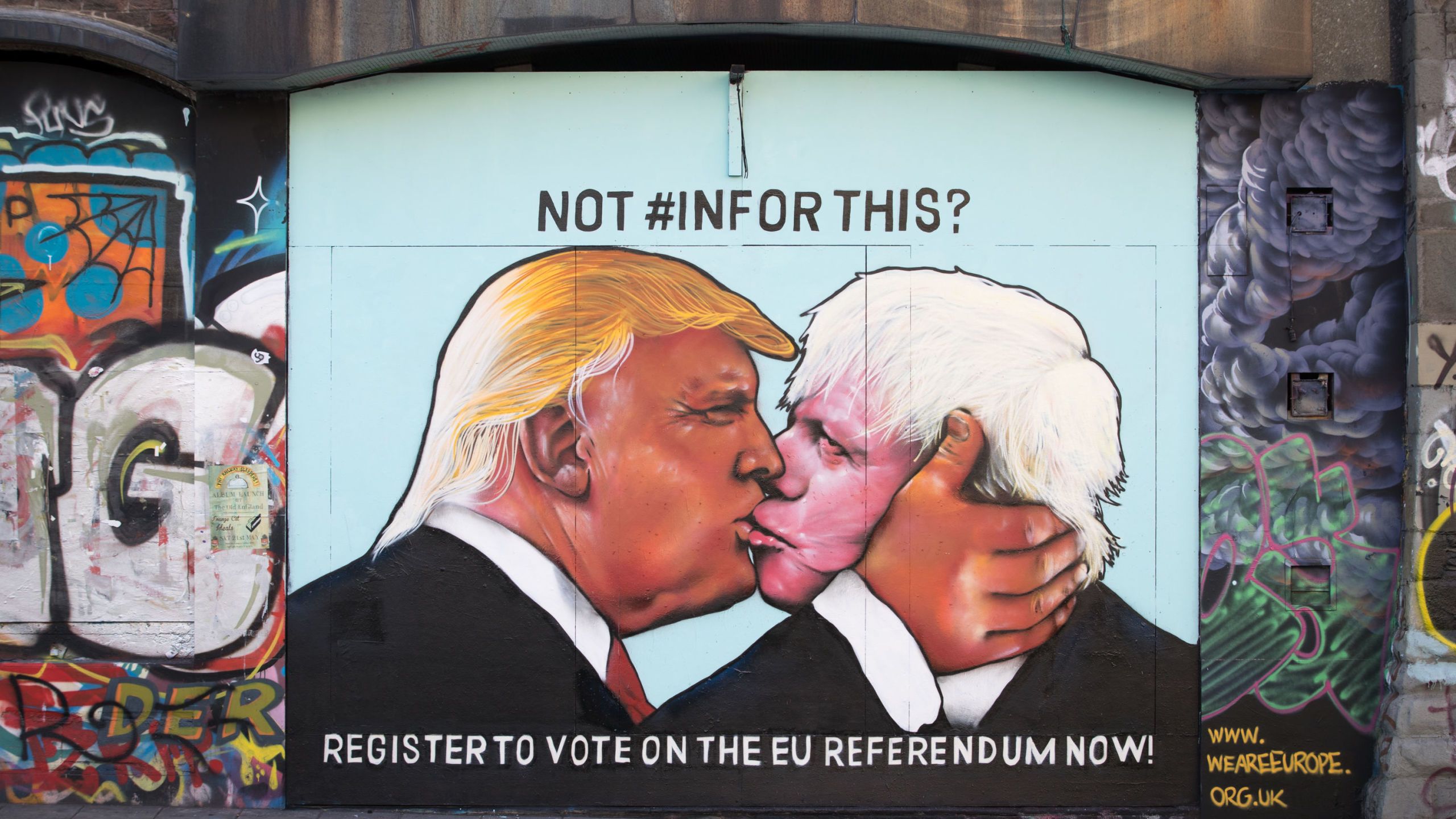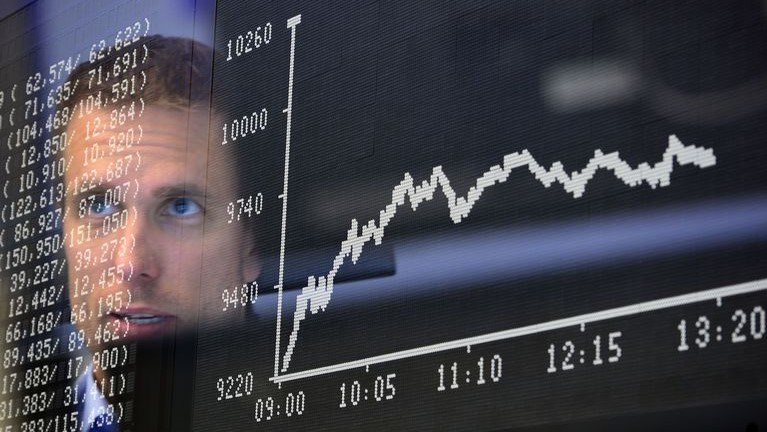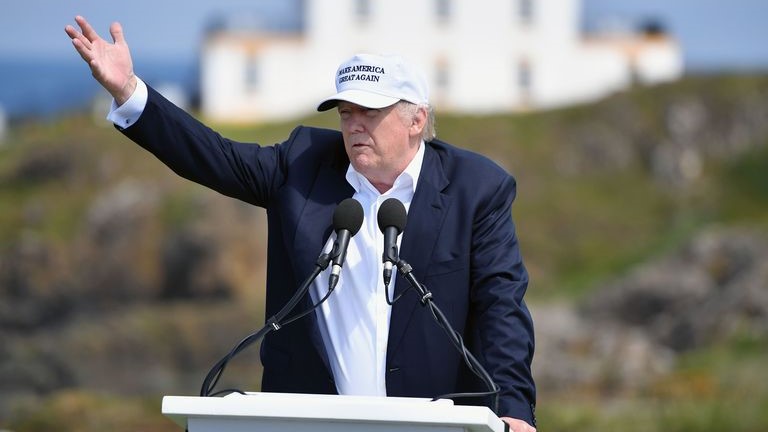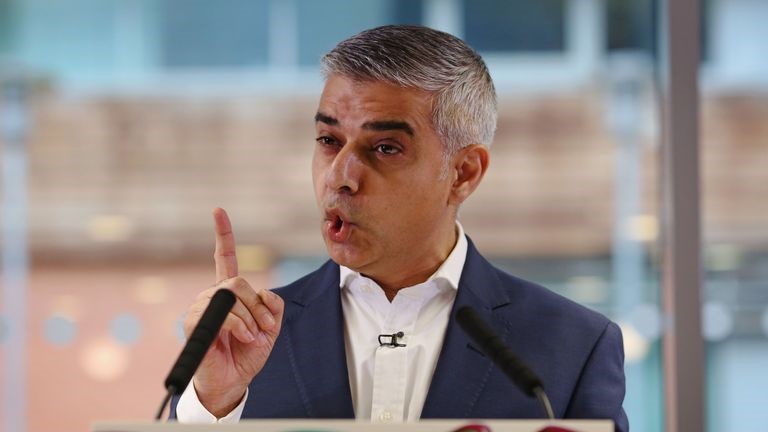Brexit: Everything You Need to Know About Great Britain Leaving the European Union
The biggest world change since the Berlin Wall came down.

Britain voted to leave the European Union on Thursday, a historic move called "the biggest world change" since the fall of the Soviet Union and "the beginning of the end of Europe as we know it." In other words, Brexit, as it's been called (short for British Exit), is a really big deal for everyone, not just the U.K. and Europe.
Biggest world change since USSR fall. We enter period of huge uncertainty, worldwide. All our lives affected.#EURefJune 24, 2016
In the hours since the vote was made official, stock markets around the world plunged, with U.S. markets falling sharply on Friday morning. David Cameron, the prime minister of Great Britain who opposed Brexit, said he will resign in October.
In the hours since the vote was made official, stock markets around the world plunged.
President Obama, who advocated for Britain to stay in the EU, said on Friday that the United Kingdom and European Union will remain "indispensable partners" of the U.S. despite Britain's vote to leave EU.
Why Did Great Britain Want to Leave the EU in the First Place?
The reason Britons wanted to leave the EU, which the country joined in 1973, is rooted in their skepticism of Europe. By joining the EU, Britain had to give up some of its own governing power and that didn't sit well with a large chunk of the population. That tension simmered for decades, but it was reignited after the 2008 recession, which hit Europe much harder than it did the U.S.
As Vox.com points out, Europe's limp economy didn't directly affect Britain, because it uses the pound as currency, not the euro. However, it stoked fears that economic turmoil on the continent would ultimately drag down Britain's economy.
Meanwhile, Britain experienced a surge of migrants from the continent in the last five years. Anti-immigrant feelings started to take hold, fueled in the last year by immigrants pouring into Europe—and then Britain—from war-torn countries in the Middle East and North Africa.
Get exclusive access to fashion and beauty trends, hot-off-the-press celebrity news, and more.
For that reason, the campaign leading to Thursday's stunning vote shared some of the nationalist, populist themes driving Donald Trump's campaign, including a wariness of immigration, concern about borders, and skepticism of the value of multinational organizations.
The decision—which was nonbinding, meaning British leaders are under no legal obligation to follow through, although they most certainly will—now launches a years-long process to renegotiate trade, business, and political links between the United Kingdom and the European Union, an unprecedented divorce that could take decades to complete.
"The dawn is breaking on an independent United Kingdom," said Nigel Farage, leader of the U.K. Independence Party. "Let June 23 go down in our history as our independence day!"
David Cameron, who had led the campaign to keep Britain in the EU, said he would resign by October and left it to his successor to decide when to invoke Article 50, which triggers a departure from European Union.
"I will do everything I can as prime minister to steady the ship over the coming weeks and months," he said, "but I do not think it would be right for me to try to be the captain that steers the country to its next destination."
'Leave' won with 52 percent of the votes.
Polls ahead of the vote had shown a close race, and the momentum had increasingly appeared to be on the "remain" side over the last week. But in an election Thursday marked by notably high turnout—72 percent of the more than 46 million registered voters—"leave" won with 52 percent of the votes.
Unclear What It All Means
Britain would be the first major country to leave the EU, which was born from the ashes of World War II as European leaders sought to avoid World War III. It's now unclear what all of this will mean for Europe.
Leaders from across the EU voiced regret at the British decision.
Leaders from across the EU voiced regret at the British decision. Germany called top diplomats from the EU's six founding nations to a meeting Saturday, and the president of the European Council, Donald Tusk, said the bloc will meet without Britain at a summit next week to assess its future. Tusk vowed not to let the vote derail the European project.
"What doesn't kill you, makes you stronger," he said.

A trader in Germany watches as markets react to Brexit.
But already, far-right leaders in France and the Netherlands were calling for a similar anti-EU vote.
The referendum showed Britain to be a sharply divided nation: Strong pro-EU votes in the economic and cultural powerhouse of London and semi-autonomous Scotland were countered by sweeping anti-Establishment sentiment for an exit across the rest of England, from southern seaside towns to rust-belt former industrial powerhouses in the north.
"It's a vindication of 1,000 years of British democracy," commuter Jonathan Campbell James declared at the train station in Richmond, southwest London. "From Magna Carta all the way through to now we've had a slow evolution of democracy, and this vote has vindicated the maturity and depth of the democracy in our country."
Others expressed anger and frustration. Olivia Sangster-Bullers, 24, called the result "absolutely disgusting."
"Good luck to all of us, I say, especially those trying to build a future with our children," she said.
Felix Salmon, a journalist in the U.S. who hails from Great Britain, said in article for the website Fusion that the vote marks the end of Europe as we know it. He also said leaving the EU will hurt young people more than old.
The result, he added, "is that we are now entering a world in retreat from progress, a world of atavistic nationalisms and mutual distrust, a world in which we demonize foreigners and prefer walls to bridges."
Cameron called the referendum largely to silence voices to his right, then staked his reputation on keeping Britain in the EU.
Former London Mayor Boris Johnson, who is from the same party, was the most prominent supporter of the "leave" campaign and now becomes a leading contender to replace Cameron. The vote also dealt a blow to the main opposition Labour Party, which threw its weight behind the "remain" campaign.
"A lot of people's grievances are coming out and we have got to start listening to them," said deputy Labour Party leader John McDonnell.
Indeed, the vote constituted a rebellion against the political, economic, and social Establishment. All manner of groups—CEOs, scientists, soldiers—had written open letters warning of the consequences of an exit.
Nigel Farage called the result "a victory for ordinary people against the big banks, big business, and big politics."
Donald Trump praised the decision during a visit to one of his golf courses in Scotland, saying Britons 'took back their country. It's a great thing.'
Donald Trump praised the decision during a visit to one of his golf courses in Scotland, saying Britons "took back their country. It's a great thing." He likened the vote to the U.S. sentiment that has propelled him to the presumptive Republican presidential nominee, saying people in the United States and the United Kingdom are angry about similar things.
"People are angry all over the world," he said.

Donald Trump in Scotland.
After winning a majority in Parliament in the last election, Cameron negotiated a package of reforms that he said would protect Britain's sovereignty and prevent EU migrants from moving to the U.K. to claim generous public benefits.
Critics charged that those reforms were hollow, leaving Britain at the mercy of bureaucrats in Brussels and doing nothing to stem the tide of European immigrants who have come to the U.K. since the EU expanded eastward in 2004. The "leave" campaign accuses the immigrants of taxing Britain's housing market, public services and employment rolls.
Those concerns were magnified by the refugee crisis of the past year that saw more than 1 million people from the Middle East and Africa flood into the EU as the continent's leaders struggled to come up with a unified response.
Mindful of the intense rhetoric, the mayor of London, Sadiq Khan, reached out to the 1 million Europeans in the capital and underscored that they are "very welcome here."
"We all have a responsibility to now seek to heal the divisions that have emerged throughout this campaign—and to focus on what unites us, rather than that which divides us," he said.

London Mayor Sadiq Khan.
Cameron's efforts to find a slogan to counter the "leave" campaign's emotive "take back control" settled on "Brits don't quit." But the appeal to a Churchillian bulldog spirit and stoicism proved too little, too late.
The slaying of pro-Europe lawmaker Jo Cox a week before the vote brought a shocked pause to both campaigns and appeared to shift momentum away from the "leave" camp. While it isn't clear whether her killer was influenced by the EU debate, her death aroused fears that the referendum had stirred demons it would be difficult to subdue.
The result triggers a new series of negotiations that is expected to last two years or more as Britain and the EU search for a way to separate economies that have become intertwined since the U.K. joined the bloc on Jan. 1, 1973. Until those talks are completed, Britain will remain a member of the EU.
Exiting the EU involves taking the unprecedented step of invoking Article 50 of the EU's governing treaty. While Greenland left an earlier, more limited version of the bloc in 1985, no country has ever invoked Article 50, so there is no roadmap for how the process will work.
Authorities ranging from the International Monetary Fund to the U.S. Federal Reserve and the Bank of England have warned that a British exit will reverberate through a world economy that is only slowly recovering from the global economic crisis. The European Union is the world's biggest economy and the U.K.'s most important trading partner, accounting for 45 percent of exports and 53 percent of imports.
The complex nature of Britain's integration with the EU means that breaking up will be hard to do.
In addition, the complex nature of Britain's integration with the EU means that breaking up will be hard to do. The negotiations will go far beyond tariffs, including issues such as cross-border security, foreign policy cooperation and a common fisheries policy.
It will also affect the ability of professionals such as investment managers, accountants and lawyers to work in the EU, threatening London's position as one of the world's preeminent financial centers. The U.K. hosts more headquarters of non-EU firms than Germany, France, Switzerland and the Netherlands put together.
"We believe this outcome has serious implications for the City and many of our clients' businesses with exposure to the U.K. and the EU," said Malcolm Sweeting, senior partner of law firm Clifford Chance. "We are working alongside our clients to help them as they anticipate, plan for and manage the challenges the coming political and trade negotiations will bring."
Marie Claire editors in New York as well as Associated Press writers Raphael Satter and Frank Jordans in London and Shawn Pogatchnik in Dublin contributed to this report.
Follow Marie Claire on Facebook for the latest celeb news, beauty tips, fascinating reads, livestream video, and more.